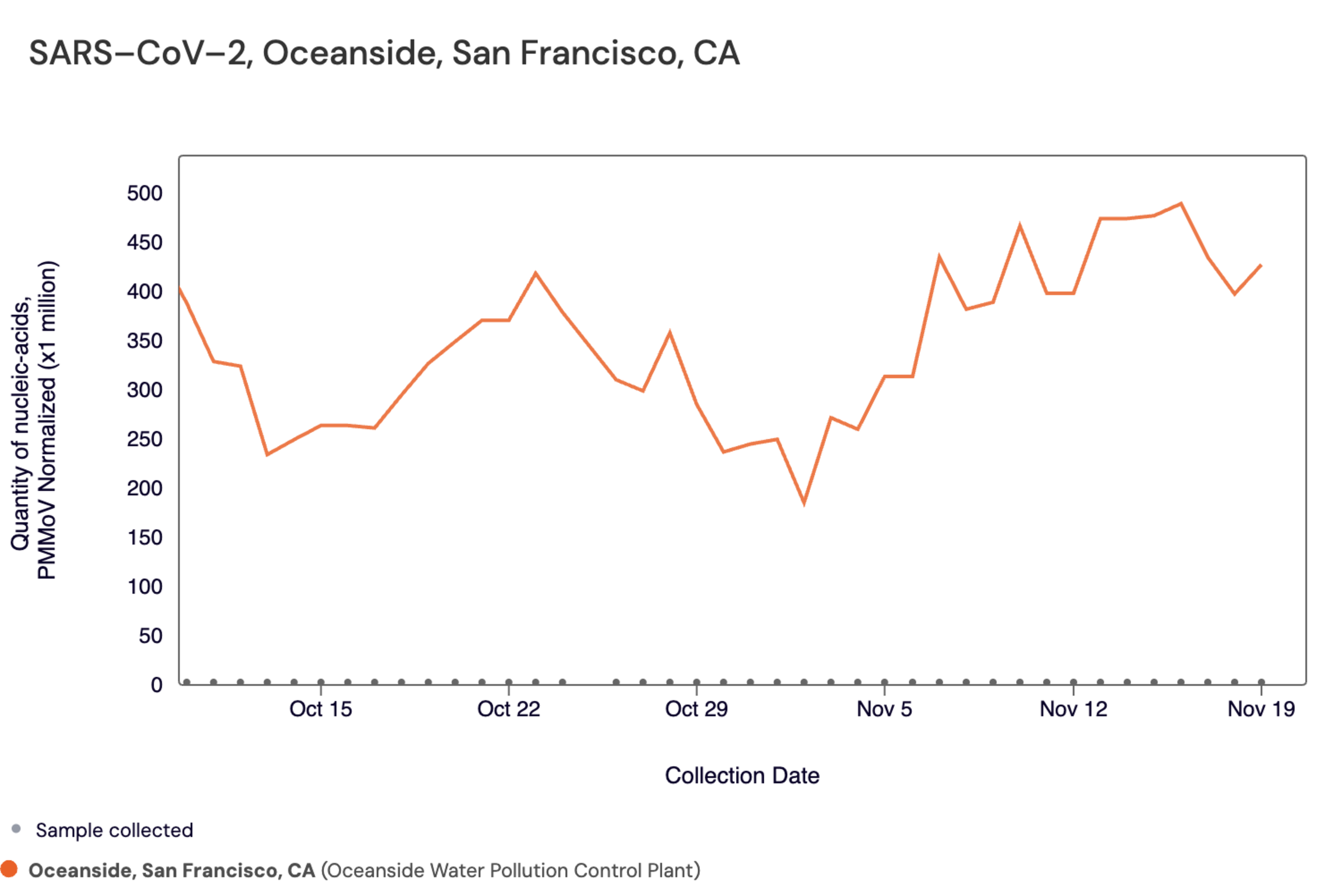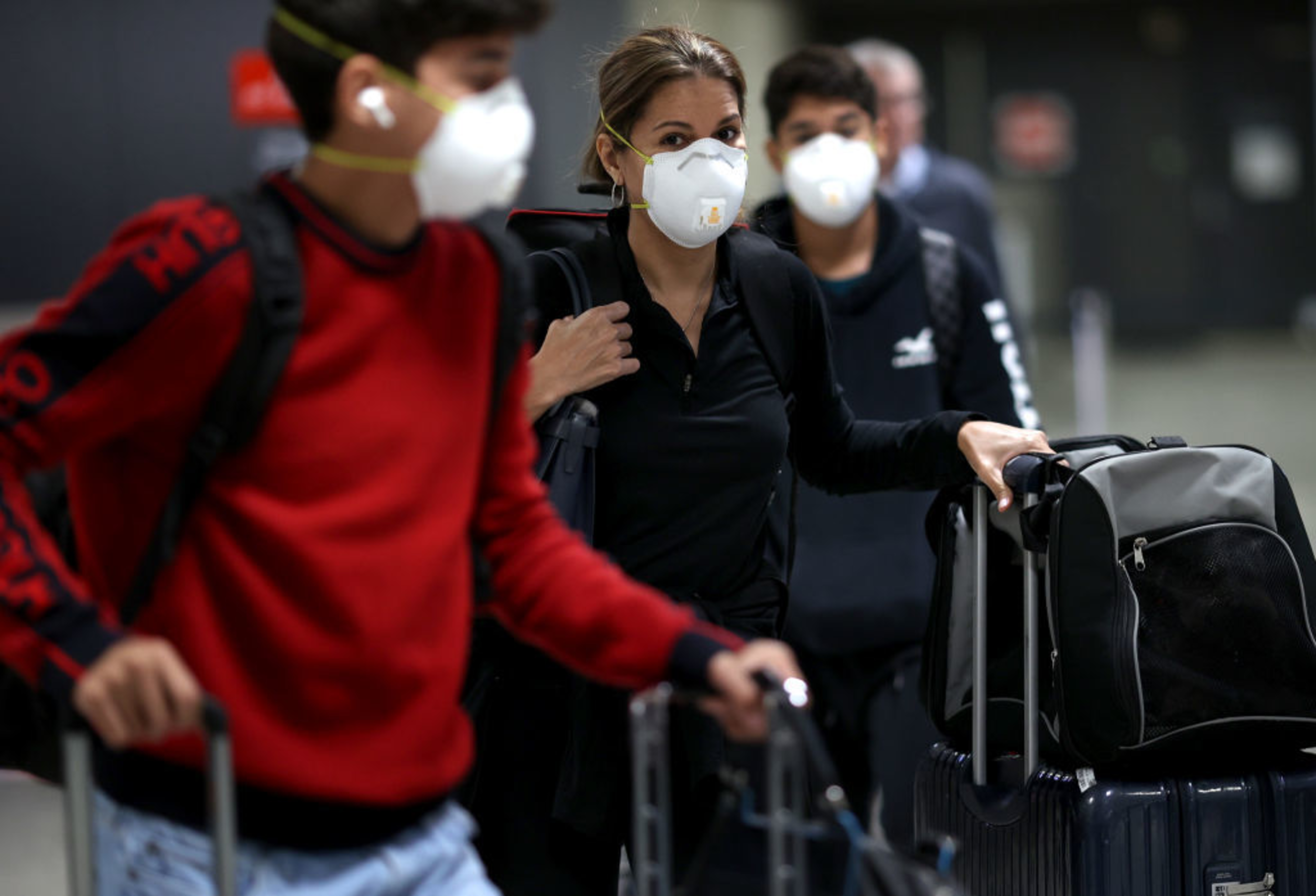Covid cases are rising in San Francisco, just in time for Thanksgiving and holiday travel.
New data from WastewaterScan—a program that traces levels of viruses and other pathogens in municipal sewershed plants—shows San Francisco Covid levels in wastewater are rising in the city’s two water treatment plants. The data shows cases began ticking upward within the last six weeks.
Covid levels from San Francisco’s Oceanside wastewater plant, which covers the city’s west side, peaked on Nov. 16 and have since dropped slightly. Covid levels at the city’s Southeast Treatment Plant peaked on Saturday. Sunday shows a slight drop at the Southeast plant.

Wastewater Covid levels dropped to their lowest over the last six weeks at the Oceanside plant on Nov. 2 and their lowest at the city’s Southeast plant on Oct. 30. However, both plants show a high virus concentration in city sewage.
Influenza and respiratory syncytial virus (RSV) levels also appear to be creeping upward at the Oceanside plant, though neither pathogen reached the peaks seen during winter flu season. The city’s Southeast sewershed, which covers the eastern half of San Francisco, did not record the same spike in either pathogen. Flu virus remains at a low concentration in the city’s two plants, while RSV remains high.

The San Francisco Department of Public Health said RSV activity has increased over the last two months and continues to rise in San Francisco. The department said flu and Covid levels remain relatively low but have begun to rise.
The department said San Franciscans should do the following to protect themselves and others from illness this holiday season:
- Everyone over the age of 6 months should get both an updated Covid vaccine and this year’s flu vaccine.
- People aged 60 and over and pregnant people should ask their providers about the RSV vaccine. All pregnant people should receive the vaccine between weeks 32-36 of pregnancy.
- Keep a well-fitted mask on hand for added protection in crowded indoor spaces.
- Stock up on Covid at-home test kits. This way, if you feel sick, you can test right away and act quickly to get medicine to stop the illness from becoming serious. Medicine is recommended for most adults and some teens. You must start the medicine within 5 days after starting to feel sick—but as soon as possible is best.
- If you think you may have the flu, contact a health care provider immediately to get tested. Flu medicine is recommended for children younger than age 2, adults age 65 and older, pregnant people and people with a variety of health conditions. You must start the medicine within 2 days after starting to feel sick.
- Stay home when sick, and stay away from others who are sick.
- Increase ventilation or air filtration when indoors if possible.
- Practice good hygiene: Wash hands, cover coughs and sneezes, and avoid touching your eyes, nose and mouth.
How To Get Free Covid Tests
Reporting by AP’s Amanda Seitz
The U.S. government is offering to send another round of four at-home virus tests ahead of the typical surge in cases during the winter holiday season.
Anyone who did not order a batch of four Covid tests in September can secure up to eight of them this time around starting Monday at Covid.gov/tests (opens in new tab). The U.S. Postal Service will deliver them for free.
The government is mailing out the coronavirus tests as the flu season kicks off and a spike in RSV cases has been reported in some spots around the country. Hospitalizations for Covid, which has killed more than 1 million people in the United States, were on the rise this fall but have stayed steady in recent weeks. Immunity from previous vaccinations and infections has kept case counts lower compared with other years.

The new release of free Covid nasal swab tests also comes ahead of the first winter since the pandemic started that insurers are no longer required to cover the cost of them. On average, at-home tests now cost $11 out of pocket, according to an analysis by the nonprofit health research firm KFF.
The Food and Drug Administration also approved updated Covid vaccines in September in the hopes of revving up protection for Americans this winter. The shots target an Omicron descendant named XBB.1.5, replacing older vaccines that targeted the original coronavirus strain and a much earlier Omicron version. Shots are recommended for everyone age 6 months or older, but uptake has been slow.
U.S. taxpayers have spent tens of billions of dollars to develop Covid tests, vaccines and treatments in the three years since the pandemic started.
